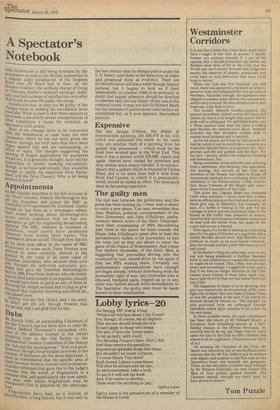A Spectator's Notebook
John Stonehouse is still being hounded by the newspapers as well as the British authorities in a manner sadly reminiscent of the Stephen Ward case. Dr Ward had to face, on the flimsiest evidence, the unlikely charge of living on Christine Keeler's immoral earnings. Authority reached a climax of satisfaction only after Ward took his own life under the strain. •
Stonehouse may or may not be guilty of the Charges listed in seeking his extradition from Australia. What is clear is that there appears to 'have been a peculiarly severe interpretation of what constitutes a cause for criminal, as oPPosed to civil, action. Most of the charges seem to be connected with the withdrawal of cash from his own companies, which he has not been given the Chance, through the civil suits that have been begun against him and are outstanding, to refute or repay. The charges suggesting the uttering of forged applications for passports Would not, it is generally thought, have led the. authorities to bother seeking extradition, though, as we have said already, they would be enough to justify his expulsion from Parliament and the Privy Council. Why is he being Pressed so hard?
Appointments
As Bill Grundy describes in his full account in our 'press, column, Alastair Hetherington has left the Guardian and joined the BBC as Controller of Programmes for Scotland. Useful though he has been as a newspaper editor, there seems nothing about Hetherington's career which indicates that he has any eXperience or gift for originating broadcasting Material. The BBC, whether in Scotland or elsewhere, could surely have promoted s_omeone from within their ranks. The Guardian is almost as odd. Though they did not go for their next editor to the ranks of BBC technicians or some such, Peter Preston was selected or, more correctly, elected to the Position by the votes of an inner cabal of G • uctrdicin journalists, who secured their own Jobs through the well-tried autocratic prockesses that gave the Guardian Hetherington kuack in 1956. Poor Peter Jenkins, who obviously has not tried hard enough to be popular, though thti.7 Would have been as good as any of them at rowing his weight around and trying to give was Paper that superior, knowing and elitist air„ '4.,s Passed over , Jenkins was my first choice, and I am sorry he didn't get the job; though Preston was MY second, and I am glad that he has.
babs
the Patrick Neill, an outstanding Chairman of h e Bar Council, has not been slow to refer Mr ustice Melford Stevenson's outspoken criti3isrn of the defence counsel in the recent bombing case at the Old Bailey to the Professional Conduct Committee of the Senate for 'full and fair investigation." Well and good. However though the principles involved in the Conduct of barristers are the more important, it rn,ost be remembered that the specific area of clash between defence counsel and profession al Police witnesses that gave rise to the judge's remarks was the worth of fingerprints in a cilrninal trial, and particularly the now admitted ease with which fingerprints may be , transposed (that is, Planted) by the unscrupulous.
Fingerprints have had, as a system of identification, a long history, but it was only in the last century that the Bengal police under Sir E. R. Henry used them in the detection of crime and presented them as evidence. Their use for identification still has a valid though limited purpose, but it begins to look as if their admissibility in criminal trials is so seriously in doubt that urgent attention should be directed to whether they are any longer of any use in the criminal courts. It may not suit Sir Robert Mark but the interests of justice must come before an established but, as it now appears, discredited practice.
Expensive
The late Jacque O'Hana, the dealer in impressionist painting, left £98,470 in his will, which was published this week. At the same time, yet another theft of a painting from his gallery was announced — which must be the most over-worked spot in the West End. This time it was a picture worth £35,000. Again and again, thieves have visited his premises and they seldom leave empty-handed. It is extraordinary that a gallery which is situated in Carlos Place, and is no more than half a mile from West End Central, to which it is presumably Wired, should be raided so often. The insurance must be becoming expensive.
The guilty men
The taxi war between the politicians and the press has been hotting up, I hear, and is about to enter a new phase. You may remember that Alan Watkins, political correspondent of the New Statesman, and John O'Sullivan, parliamentary sketch writer of the Daily Telegraph, have been complaining of MPs shouldering past them in the queue for taxis outside the House. John O'Sullivan's latest idea to beat the parliamentary bullies is for journalists to hail • the taxis just as they are about to enter the gates of the Palace of Westminster. And I hear that Andrew Alexander, of the Daily Mail, is suggesting that journalists driving into the courtyard by taxi, should drive on out again if they see MPs waiting there. Certainly our parliamentary representatives have enough privileges already, without interfering with the journalists' right of way. Any journalist who is elbowed, trampled upon, tripped up or in any other way bullied should write immediately to The Spectator: the guilty men must be made known to their constituents.


































 Previous page
Previous page